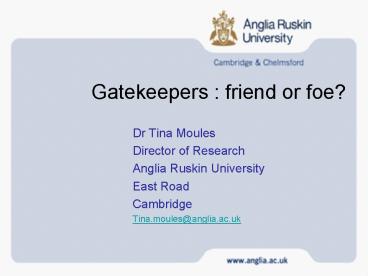Gatekeepers : friend or foe - PowerPoint PPT Presentation
1 / 17
Title:
Gatekeepers : friend or foe
Description:
Emotional state. Lack of trust. Factors affecting gatekeepers' ... Level of maturity and confidence. Past experience. Emotional state. Age. Enhancing ... – PowerPoint PPT presentation
Number of Views:90
Avg rating:3.0/5.0
Title: Gatekeepers : friend or foe
1
Gatekeepers friend or foe?
- Dr Tina Moules
- Director of Research
- Anglia Ruskin University
- East Road
- Cambridge
- Tina.moules_at_anglia.ac.uk
2
- Because of the status of children and young
people, adults are frequently charged with making
decisions on their behalf. - Accessing children for research studies and
gaining informed consent can therefore normally
needs the co-operation of a number of different
gatekeepers.
3
Overview of presentation.
- Who are the gatekeepers and what is their role?
- Factors affecting the decisions of gatekeepers
and the consequences. - Enhancing chances of gaining access to children
via gatekeepers.
4
Who are the gatekeepers?.............
- Gatekeepers are those who give researchers access
to the research field and to participants. - Hek et al. (1996) define gatekeepers as those
people who attempt to safeguard the interests of
others.
5
Who are the gatekeepers?.............
- Research Ethics Panels
- Professional health and social care providers
- Education professionals
- Legal guardians
- Family members
- The children
6
A long chain of negotiation...
- In a study of looked after children by
Heptinstall (2000) there were potentially 7
levels of gatekeepers in two authorities making a
total of up to 14 people to influence - Research Group of Associate Directors of Social
Services (would now be an ethics panel) - Directors of Social Services
- Childrens Service Managers
- Social Workers
- Birth parents
- Foster parents
- Children
7
And another....
- In my own study with children who had been in
hospital I had to gain access via the following
gatekeepers - 2 Local NHS Research Ethics Committees
- 14 Consultants
- 4 Ward managers
- And then.
- Following a change of plan
- 4 Head teachers
- Parents
- Young people
8
The bottom line is..
- Researchers can normally only access children and
young people with the co-operation of a number of
different gatekeepers. - No co-operation no research.
9
Gatekeepers influence..
- Gatekeepers play a vital role in safeguarding
children from damaging research. However.. - They can also use their position and power to
defer to adult decisions thereby censoring
children. - Gatekeepers ability to block childrens
participation can constrain children from
deciding for themselves whether or not to
participate and prevents their voices from being
heard.
10
Gatekeepers decisions..
- Heath et al (2004) studied researchers views and
experiences of the impact gatekeepers have on
research and the difficulties encountered in
negotiating informed consent via institutional
gatekeepers. - Gatekeepers responses sensitive arranging access
to young children - Access denied blocking even before parents can
give their views about participation. - Gatekeepers who are really keen can actually make
dissent by children difficult (Curtis et al.
2004).
11
Factors affecting gatekeepers decisions..
- The attitudes of adults
- Power relationships
- Beliefs and values
- Responsibility to protect
- Emotional state
- Lack of trust
12
Factors affecting gatekeepers decisions..
- Situational factors
- Context of the research
- Nature of the topic (Cree et al. 2002)
- Time constraints
- Other events
- Lack of information
13
Factors affecting gatekeepers decisions..
- Individual characteristics of children/young
people - Perceived level of competence,
- Level of maturity and confidence
- Past experience
- Emotional state
- Age
14
Enhancing chances of positive response
- Ethically sound, good proposal, well prepared
- Clear detailed information
- Understand gatekeepers philosophy/structure
- Know who to approach
- Show the benefits
- Use your networks, negotiate.
15
Children and young people as gatekeepers..
- It could be argued that these are the most
important gatekeepers. - Even if all other levels of gatekeeper give their
agreement or consent for a child to participate
it is the child who should have the final word. - Children quite rightly may not want to
participate - However..
16
Children and young people as gatekeepers..
- It may be difficult for a children to dissent
when all the adults around them have
agreed/consented. - Consent may be based on a desire to please or
even a fear of the consequences of being seen as
uncooperative. - Adults may coerce or use their power to force a
child to participate. - Childrens consent may be assumed.
17
Summary.
- Accessing children for research will always be
dependent to some extent on gatekeepers. - Gatekeepers can play a positive role in
protecting children from poor research. - However gatekeepers can also have a negative role
by silencing childrens voices. - Know who your gatekeepers are.
- Respect the child as gatekeeper.































